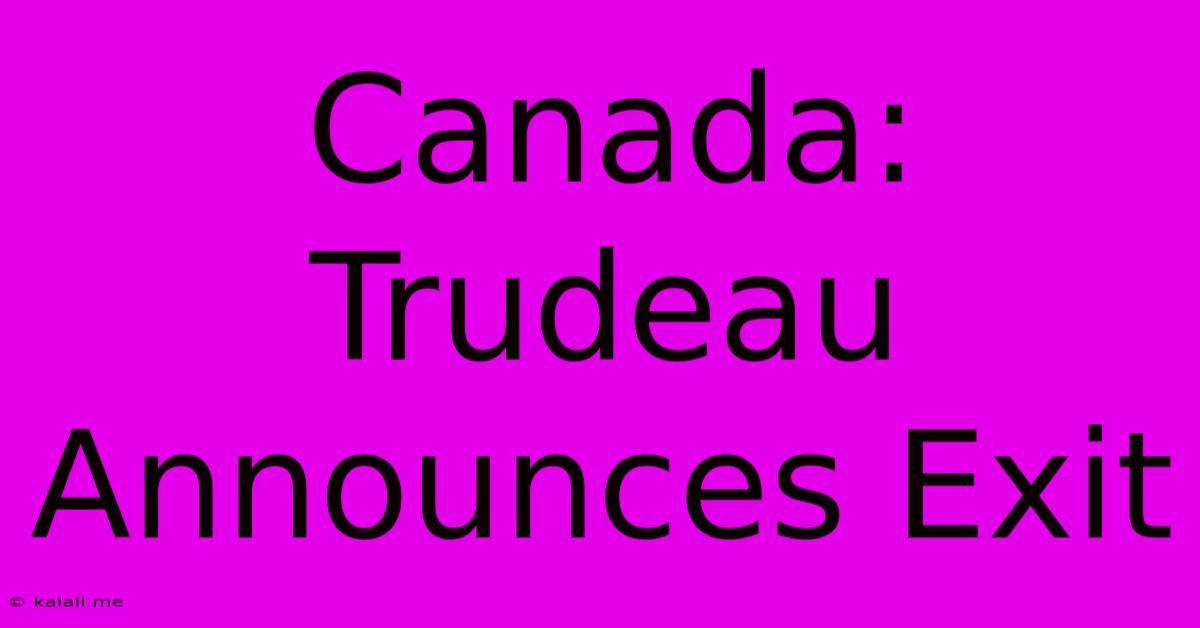Canada: Trudeau Announces Exit
Kalali
Jan 08, 2025 · 4 min read

Table of Contents
Canada: Trudeau Announces Exit – A New Chapter Begins
Prime Minister Justin Trudeau's recent announcement of his departure marks a significant turning point in Canadian politics. His decade-long tenure, marked by both triumphs and controversies, leaves a legacy that will be debated for years to come. This article delves into the implications of Trudeau's exit, exploring the potential successors, the challenges facing the Liberal Party, and the broader impact on Canada's domestic and international relations.
The Trudeau Era: A Retrospective
Justin Trudeau's time as Prime Minister was undeniably transformative. He swept into power in 2015, promising a new era of progressive politics. His initial focus was on reconciliation with Indigenous peoples, a commitment reflected in initiatives aimed at addressing historical injustices and fostering self-determination. He also championed a more feminist approach to governance, appointing a gender-balanced cabinet and advancing policies promoting gender equality.
Key policy achievements during Trudeau's time in office include the legalization of cannabis, the implementation of a national carbon tax, and significant investments in social programs. His government also played a prominent role in international affairs, advocating for multilateralism and progressive values on the global stage.
However, Trudeau's premiership was not without its controversies. The SNC-Lavalin affair, allegations of inappropriate political interference, and criticism surrounding his handling of the COVID-19 pandemic all cast shadows over his leadership. These events, combined with a sense of political fatigue amongst some segments of the population, likely contributed to the decision to step down.
Analyzing Trudeau's Legacy
Trudeau's legacy is complex and multifaceted. While he successfully modernized the Liberal Party and attracted a new generation of voters, he also faced persistent criticism regarding his handling of certain crises and accusations of elitism. His commitment to progressive values resonated with many Canadians, but his ambitious policy agenda also faced significant hurdles and resulted in some policy backlashes. Ultimately, evaluating his full legacy will require a longer historical perspective.
The Liberal Party's Future: A Leadership Vacuum
With Trudeau's departure, the Liberal Party faces the immediate challenge of selecting a new leader. Several prominent figures within the party are expected to vie for the top position, each bringing their own strengths and weaknesses to the table. The leadership race will undoubtedly shape the party's future direction and its ability to remain a competitive force in Canadian politics.
Potential Successors and Their Platforms
The race to succeed Trudeau will likely be fiercely contested. Several potential candidates already emerge from within the Liberal party ranks. Each potential successor will need to articulate a clear vision for the party's future, addressing issues such as economic growth, climate change, healthcare reform, and reconciliation with Indigenous peoples. Their ability to unify the party and appeal to a broad range of voters will be crucial for their success. The internal dynamics of the Liberal party, including regional representation and ideological divides, will play a major role in determining the outcome of the leadership race.
The Impact on Canadian Politics
Trudeau's departure will undoubtedly reshape the political landscape of Canada. The opposition parties, including the Conservatives, New Democrats, and Bloc Québécois, will be eager to capitalize on the transition and present themselves as viable alternatives. The upcoming leadership race within the Liberal party will be pivotal in shaping its future trajectory and its ability to maintain its position as a leading political force.
Economic and Social Implications
The change in leadership will likely have significant implications for Canada's economy and social policies. The new leader will need to address pressing issues such as inflation, housing affordability, and healthcare reform. Their approach to these issues will shape the direction of the country's economic and social development in the coming years. How the next leader handles the existing policy frameworks put in place by Trudeau will significantly impact Canadians.
Foreign Policy Considerations
Canada's role in international affairs is also likely to be affected by the change in leadership. Trudeau's emphasis on multilateralism and progressive values in foreign policy may be moderated or altered depending on the approach taken by his successor. Canada's relationships with key allies and partners, particularly the United States, will continue to be of paramount importance. The new prime minister will need to navigate the complex geopolitical landscape and define Canada's role in shaping global affairs.
Conclusion: A Nation in Transition
Justin Trudeau's announcement marks the beginning of a new chapter in Canadian politics. His legacy will be a subject of ongoing debate, but his departure leaves a significant void in the political system. The Liberal Party faces the challenge of choosing a new leader who can unify the party, address the pressing issues facing the nation, and maintain Canada's standing on the world stage. The upcoming leadership race and the subsequent federal election will be crucial in shaping the future direction of Canada. The path ahead is uncertain, but the nation's ability to navigate this transition successfully will depend on the political leadership and the engagement of its citizens. The Canadian people, along with the global community, will be closely watching this significant political moment in Canadian history. The next few years will be vital in shaping Canada’s political landscape and the path its new leadership will steer the country on.
Latest Posts
Latest Posts
-
What Is The Average Iq For A 5 Year Old
Jul 12, 2025
-
How Many 12 Oz Cups In A Gallon
Jul 12, 2025
-
How Much Older Is John The Baptist Than Jesus
Jul 12, 2025
-
How Many Teaspoons In A Pound Of Sugar
Jul 12, 2025
-
How Do You Pass Level 12 On Bloxorz
Jul 12, 2025
Related Post
Thank you for visiting our website which covers about Canada: Trudeau Announces Exit . We hope the information provided has been useful to you. Feel free to contact us if you have any questions or need further assistance. See you next time and don't miss to bookmark.